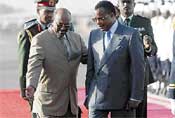EU edges toward agreement on Congo force
European Union nations appeared close Monday to agreeing plans to provide up to 1,500 troops in support of U.N. peacekeepers in Congo when the African nation holds a series of landmark elections starting in June. After weeks of hesitation, German Defense Minister Franz-Josef Jung said his country had agreed to lead the EU mission, backed by troops from France, Spain, Poland and several other nations.

"We have together agreed that the command headquarters in Potsdam will take overall responsibility for the mission," Jung told Germany's Hessiche Rundfunk radio.
He spoke as the EU foreign affairs chief Javier Solana briefed European foreign ministers on his talks Sunday in the Congolese capital with President Joseph Kabila and other political leaders. Germany had insisted Solana hold face-to-face talks in Kinshasa to agree with the Congolese authorities on details of the mission. Solana's trip to Congo was meant to nudge the EU nations to make a formal decision to contribute soldiers to the U.N. force.
Germany and France have been insisting on a wide participation from the 25 EU nations, but governments have been reluctant to provide troops without guarantees about the nature and duration of the potentially dangerous mission.
Jung said the plans foresaw French troops running a base in Kinshasa. Spain and Poland each have offered 100 soldiers, and Sweden and Belgium would each send 50, Jung said. Italy, Greece, Austria, Ireland, Britain and Portugal were also willing, he said.
"One can really talk of a European mission here," Jung said. The U.N. has most of its 16,000 peacekeepers in Congo's unruly east and is seeking European troops to deter unrest in the capital during the elections and provide rapid back up to its blue-helmeted soldiers if they run into trouble. Apart from up to 450 in Kinshasa, most of the European troops are expected to be based outside of Congo either in a neighboring nation or in Europe ready to intervene if violence erupts.
Nevertheless, governments have been wary about committing soldiers, largely because of concerns that their forces could get dragged into a renewed civil war in Congo if the elections go badly. EU governments are expected to impose a four-month time-limit on their deployment. The U.N. peacekeepers in Congo frequently come under fire in the country's east. European troops would be used to provide emergency backup and evacuation for the U.N. troops and civilian election observers. Congo's transitional government was established in 2003 after a devastating five-year war, reports the AP.
N.U.
Subscribe to Pravda.Ru Telegram channel, Facebook, RSS!


